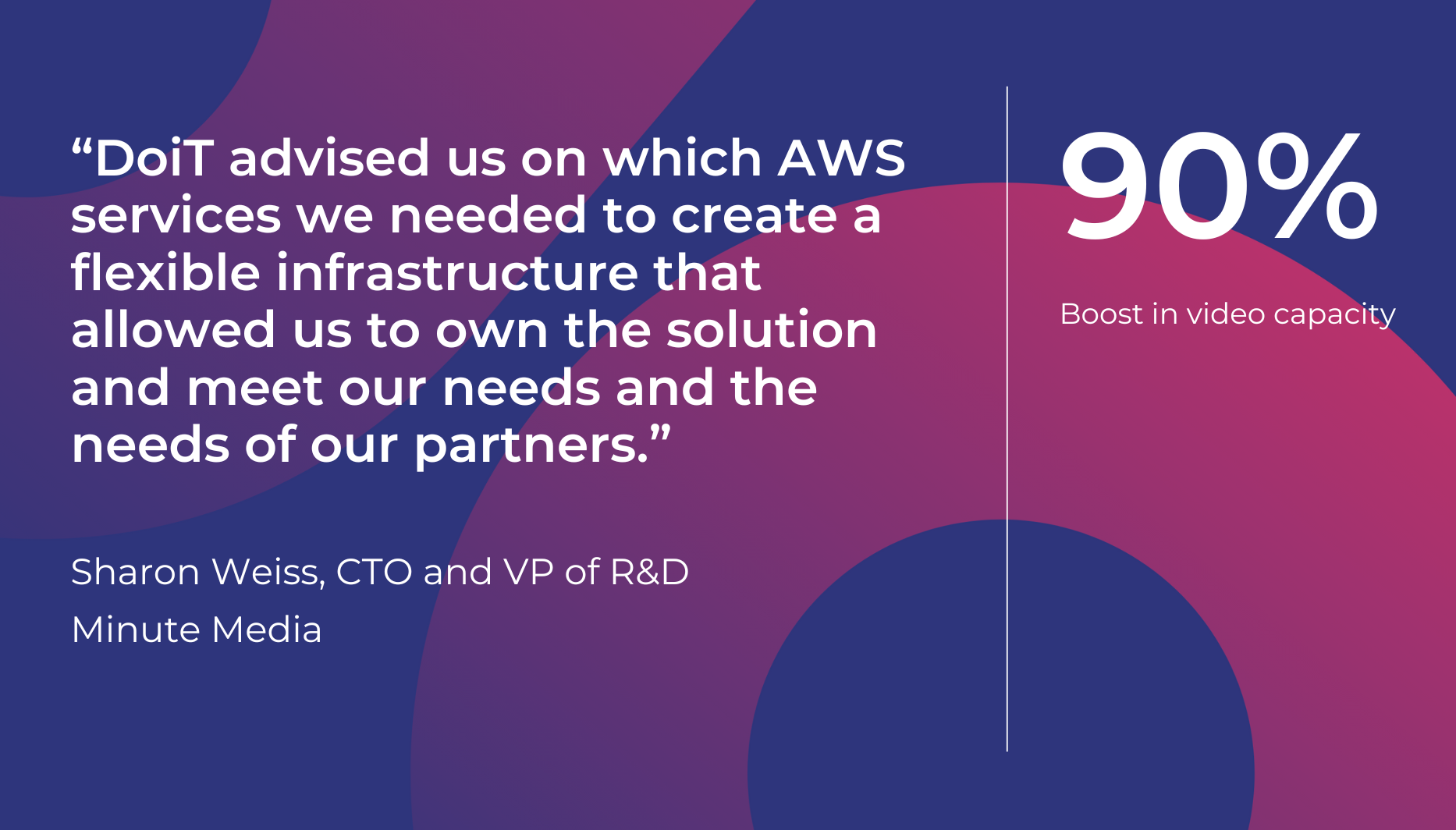
Processing millions of medical images in the cloud: DoiT helps QMENTA keep costs under control
QMENTA and DoiT optimize clinical trials, using AI and Google Cloud for efficient medical image management, yielding a 22% cost reduction.
Automatically manage cloud compute for optimized costs and agility
Make sense of spend and chargeback to align with your business

Optimize BigQuery costs with actionable recommendations and usage insights
Maximize AWS Spot savings and minimize disruptions for optimized scaling
Autonomously identify cost spikes early, with zero configuration
Organize your billing data for better business decisions
Connect your favorite tools to DoiT’s products
Learn how we’re redefining support with our customer reliability engineering
View our live support and customer satisfaction statistics in real-time
Proven solutions to cloud complexity
A global team of committed cloud experts with decades of experience in cloud architecture, Kubernetes, machine learning and much more
Learn how DoiT enables critical FinOps capabilities
DoiT Accelerators give you the dedicated cloud expertise and resources to quickly adopt new cloud services and build production-ready workloads with them.
Implement end-to-end Gen AI solutions into your product with Amazon Bedrock and more
Accelerate new EKS deployments
Develop a production-ready, modern data platform on AWS
Implement end-to-end Gen AI solutions into your product with Vertex AI and more
Accelerate new GKE deployments
Develop a production-ready, modern data platform with BigQuery and beyond

Proud to be an award‒winning multicloud partner to top‒tier cloud providers

Enabling cloud growth and unlocking revenue through expert partnership

Accelerate new customer growth and Marketplace integration on AWS and GCP
Read the latest insights, tips and perspectives from our team of cloud experts
See how we’ve helped thousands of public cloud customers achieve their goals
Listen to our experts and customers share tangible tips for navigating the cloud.
Discover foundational expertise and future-ready recommendations for the cloud
Tech talks and interactive expert sessions delivered both virtually and in person
Google Cloud Compute Engine instance comparison
Read documentation, product updates, and more
See what's new from DoiT in our latest news and announcements
How we focus on security, compliance, and privacy
Watch product demos, interviews and more from our cloud experts
Browse our open positions and learn more about what it takes to be a Do’er
Meet the team leading DoiT and our customers on a journey of hypergrowth
See what's new from DoiT in our latest news and announcements


Minute Media was founded in Tel Aviv, Israel, in 2011 as an online toolset that allowed football fans to develop and share digital content, including blog posts, photos, and videos.
After enabling the creation of an online football community, the startup expanded into other topics, such as lifestyle and entertainment—and is now a leading global media company, owning six different digital content brands that are all powered by its proprietary technology.
During this expansion, Minute Media developed an online video platform that is used by its own brands as well as more than 70 other video publishers—allowing them to create and broadcast their own content
From its beginnings, it has utilized Amazon Web Services (AWS) for its flexible infrastructure, which has allowed the company to grow rapidly while providing the necessary bandwidth and processing power to deliver increasing amounts of video content for partners and end-users. A focus on producing top-quality tools has fueled its success and made it the largest video publisher in the US, with over one billion video views and more than 350 million unique users every month.
With this scale came the need for increased resources, and that’s when Minute Media reached out to AWS Advanced Consulting Partner DoiT International for additional support with keeping the streams flowing for its licensees and on its own digital media properties: 90min, DBLTAP, FanSided, Mental Floss, The Big Lead, and The Players’ Tribune.
Bringing Minute Media’s Video Player Platform In-house
With DoiT International’s guidance, Minute Media decided to develop an online video player in-house on top of an AWS backend.
“DoiT helped us to choose the optimal technologies to create a capable and cost-effective video player platform,” says Sharon Weiss, CTO and vice president of research and development at Minute Media. “They advised us on which AWS services we needed to create a flexible infrastructure that allowed us to own the solution and meet our needs and the needs of our partners.”
After six months of development, Minute Media launched the new online video player. AWS Lambda allowed massive automatic scaling for serving and processing video. AWS Elemental MediaConvert handled video transcoding to deliver the right file format, size, and resolution necessary for good-quality video to any device.
And the solution used Amazon Simple Storage Service (Amazon S3) for reliable storage and convenient access to more than 15 TBs of video content.
Cost Savings, Shorter Development Times, Better Performance
With DoiT International’s technical advice and AWS’s flexibility, Minute Media now has full control of its platform’s development roadmap. It also experienced significant savings compared to its previous solutions. Weiss estimated using Amazon S3 and Lambda is saving the company around $10,000 to $12,000 per month on infrastructure costs, compared to its previous provider.
Minute Media has reduced development times for products, too. “AWS Elemental MediaConvert offered every feature that we wanted—all we had to do was configure it,” says Weiss. “As a result, we were able to get our video player in the market quicker.”
The new platform performed better, as well: it enabled the delivery of 70 percent more video views and provided 90 percent more capacity to upload new videos from partners and content providers, compared to the previous online video player. This has given Minute Media the capacity to grow and add more partners. And for partners, it means a more efficient process for providing new content with higher video quality to end users.
Building a Smarter Semantic Engine
With its platform firmly in control, Minute Media set out to deliver on a common request from partners: a way to automatically discover and link to related videos.
The available options provided results that were “too random,” explains Weiss, and often promoted videos unrelated to the original one.
“The challenge was to provide related content dynamically and in real time, with the best performance possible,” he says. “With online video, every millisecond matters—it can mean a delay in serving content and ads to users.”
Based on the video player’s success, Minute Media again chose a combined approach to developing a semantic engine: building certain components in-house while relying on AWS for others, and working with DoiT to identify the best choices for the project.
For the semantic engine, Minute Media developed a matching algorithm while using machine-learning capabilities in Amazon Comprehend to identify and categorize patterns in the video content. Together, AWS Lambda and Amazon S3 balanced loads at peak times to minimize lags in video delivery.
The semantic engine proved 85 percent accurate, compared to around 70 percent for competing products. According to Weiss, it gave Minute Media an advantage over rivals and contributed to winning more than 20 new partners.
The development model of building solutions in concert with AWS works well for Minute Media. “We’re a grown-up startup,” said Weiss. “And it’s something that startups like, to build their own solutions.” At the same time, Minute Media appreciated DoiT’s help in deciding which AWS services would be best for its needs.
“When DoiT advises an AWS service, I know it will work well, and it will be stable. If I want to enrich it with a piece we’ve developed, we always get support from DoiT and AWS to ensure the parts fit together.”
Scaling to Meet Shifting Demand During Lockdown
In the changeable world of video delivery, “It all comes back to scaling,” says Weiss.
The ability to scale bandwidth and compute power became essential to Minute Media during the pandemic. As large sporting events were canceled, Minute Media’s sports-focused publishing partners saw demand for video drop. At the same time, traffic on user-generated content sites increased, as more people turned to connecting online when in-person meetups were restricted.
The AWS pay-for-what-you-use model allows Minute Media to manage costs as its workloads shift and gives it the flexibility to continue to onboard new partners looking to cut costs in an uncertain economic environment.
“We pass on the savings from running such an efficient infrastructure to our partners,” said Weiss. “In the end, everyone is happy.”

QMENTA and DoiT optimize clinical trials, using AI and Google Cloud for efficient medical image management, yielding a 22% cost reduction.

DoiT helps Bdeo optimize costs for its visual intelligence technology

DoiT helps Superbet manage cloud costs as it grows
From cost optimization to cloud migration, machine learning and CloudOps,
we’re here to make the public cloud easy.
Ready to get started?